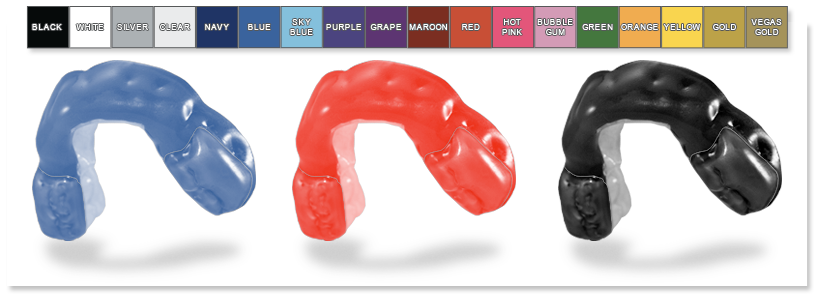Mouthguards Morgan Hill, CA
A mouthguard is a flexible appliance that is worn in athletic and recreational activities to protect teeth from trauma. The dental profession unanimously supports the use of mouthguards in a variety of sports activities.
Anyone who participates in sports, whether for pleasure, in youth or adult leagues, or even on a professional level – knows that losing isn’t the worst thing that can happen to a player; sustaining a serious injury is, particularly when that injury is preventable. That’s why it’s so important for adults and children who are active in sports to wear protective gear such as helmets, shin guards, knee and elbow pads, and mouthguards.
Wearing a mouthguard can prevent serious injury and save a lot of pain.
Each year this simple safety measure prevents more than 200,000 oral injuries among athletes.

Frequently Asked Questions
All mouthguards are not created equal.
Depending upon the design and materials used, mouthpieces will vary in fit, protection, ease of maintenance and longevity.
Listed below are several types of mouthguards. Consult Dr. Huang before you make a decision.
- Stock mouth protectors are preformed and come ready to wear. They are inexpensive and can be bought at most sporting good stores and department stores. However, little can be done to adjust their fit, they are bulky, make breathing and talking difficult, and they provide little or no protection. Dr. Huang does not recommend their use.
- Boil and bite mouth protectors also can be bought at many sporting goods stores and may offer a better fit than stock mouth protectors. The “boil and bite” mouthguard is made from thermoplastic material. It is placed in hot water to soften, then placed in the mouth and shaped around the teeth using finger and tongue pressure.
- Custom-fitted mouth protectors are individually designed and made in a dental laboratory based on Dr. Huang’s prescription. First, Dr. Huang will make an impression of your teeth, take your bite record, and measure how far your jaw protrudes. A mouthguard is then molded over the model using a special material in a dental laboratory. Due to the use of the special material and because of the extra time and work involved, this custom-made mouthguard is more expensive than the other types, but it provides the most comfort and protection.
Facial and head injuries can be sustained in nearly every game, from “contact” sports such as football, soccer, and basketball, to “non-contact” sports like baseball, gymnastics, bicycling or skateboarding.
Damage to the teeth, lips, tongue, and jaws are frequent occurrences in both children and adults.
General dentists see more injuries to the mouth as a result of playing sports than from almost any other single cause.
A survey conducted by the University of Texas found nearly 5 percent of male college athletes who played football, basketball, soccer, volleyball, baseball, ice hockey and lacrosse without wearing a mouthguard sustained some oral injury. That’s more than 2,000 injuries in just a single year at the college level alone! But it’s at the junior high, high school, community, and amateur levels that most injuries occur.
Although more research is needed, mouthguards may help prevent serious injuries such as concussions. The literature has shown that mouthguards definitely help prevent fractured jaws and teeth, severe cuts to the cheek and tongue (often requiring surgery for repair), and traumatic damage to the roots and bone that hold teeth in place.
Mouthguards are designed to help cushion the mouth, teeth, and jaw, preventing significant damage where sports injuries are most prevalent.
While mouthguards are not required equipment in many sports, wearing one is an important precaution for athletes of any age and ability.
Generally, mouthguards cover your upper teeth only, but in some instances (such as if you wear braces or another fixed dental appliance on your lower jaw), Dr. Huang will make a mouthguard for the lower teeth as well. Dr. Huang can suggest the best mouthguard for you.
An effective mouthguard should be comfortable, resist tears, be durable and easy to clean, and should not restrict your breathing or speech.
For a mouthguard to be most effective, it is essential that it fit properly and stay in place during vigorous activity and the various positions the sport requires.
Dr. Huang can determine what appliances (braces, retainers, bridgework, dentures) would be affected by wearing a mouthguard.
Because growth spurts occur in the mouth just as they do elsewhere in the body. It’s especially important for child’s mouth to be evaluated by a Dr. Huang before selecting a mouthguard.
Like all sports equipment, proper care will make any mouthguard last longer.
Keep your mouthpiece in top shape by rinsing it with soap and water or mouthwash after each use and allowing it to air-dry.
With proper care, a mouthguard should last the length of a season.
The condition of the mouthguard should be checked before each use, particularly if the athlete has a tendency to chew on it. Mouthguards may be checked by Dr. Huang at your regularly scheduled examinations.
If you or your children participate in sports, make sure that you are informed about the most common injuries that can occur during play and take appropriate steps to be protected.
Always wear a properly fitted mouthguard when you play. Do not wear removable appliances (retainers, bridges, or complete or partial dentures) when playing sports.
Staying in shape – and intact – is an integral part of an overall strategy for all sports. Protecting against injuries will keep you in the game.
Keep your competitive edge. Protect both your general and oral health for your best performance on and off the field.

